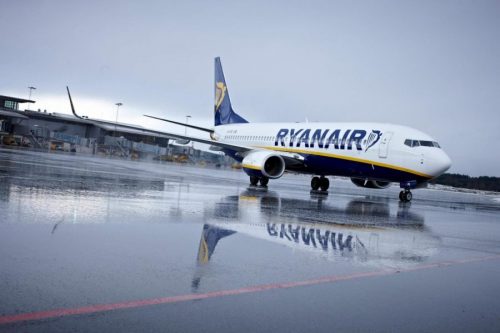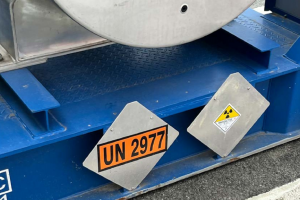Budget airline enjoys 10% rise in profits despite cancellations

Budget airline Ryanair has seen a 10% rise in annual profits over the last 12 months.
The airline saw profits after tax of €1.45bn (£1.27bn) in the 12 months partly as a result of a 9% rise in passenger numbers to 130.3 million.
The impressive figures were achieved even though the airline was forced to cancel flights in the autumn due to problems with pilots’ rotas. Ryanair added that its flights were 95% full on average.
However, its results statement showed the airline had become more cautious on the current financial year, with Ryanair cutting its profit guidance as it prepared for a surge in costs.
It warned they include a potential €400m rise in fuel bills as oil price continue to rise.
Ryanair also pointed to rising staffing costs.
Ryanair has since started work on union recognition for the first time in its history – agreeing deals with pilots’ unions in the UK and Italy.
It has also agreed new 5-year pay deals with pilots and cabin crew.
It said of the issue in the current financial year: “We expect staff costs to rise by almost €200m, half of which is higher pay for our front line people and half is additional headcount for growth.”
Chief executive Michael O’Leary said: “We are pleased to report a 10 per cent increase in profits, with an unchanged net margin of 20 per cent, despite a three per cent cut in air fares, during a year of overcapacity in Europe, leading to a weaker fare environment, rising fuel prices, and the recovery from our September 2017 rostering management failure.”
He added: “Forward bookings are strong but pricing remains soft. Since only half of Easter fell in April, we expect a five per cent fare decline in Q1 but a four per cent rise in Q2 fares.
“While still too early to accurately forecast close-in summer bookings or H2 fares, we are cautiously guiding broadly flat average fares for FY19.”
The airline also sounded a note of warning about the possible impacts of a hard Brexit.
It said: “We intend to restrict the voting rights of all non-EU shareholders in the event of a hard Brexit, so that we can ensure that Ryanair is majority owned and controlled by EU shareholders at all times to comply with our licences.
“This would result in non-EU shareholders not being able to vote on shareholder resolutions. In the meantime, we have applied for a UK Air Operating Certificate which we hope to receive before the end of 2018.
At the start of the year Ryanair announced a major investment in its Manchester hub.
It confirmed 10 new routes for this summer, including a link to The Azores.
Ryanair is basing three extra aircraft at Manchester aircraft this summer, making a total of 12.
The extra flights will increase capacity by 300,000 to a projected 4.9 million passengers and enable the airline to offer 57 routes. It also flies to more than 20 locations from Liverpool’s John Lennon airport.
Ryanair’s chief marketing officer Kenny Jacobs said: “Ryanair is delighted to announce an additional investment of $300 million at Manchester with three extra based aircraft for our peak summer 2018 schedule, bringing the total investment at Manchester to $1.2 billion.
Russ Mould, investment director at Manchester investment platform AJ Bell, said: “A key question for the market to consider is whether Ryanair’s pessimistic outlook alongside strong full year results is a classic piece of expectations management or a true reflection of the challenges facing the business.
“After all, chief executive Michael O’Leary’s ‘pessimistic side of cautious’ guidance sets a fairly low bar for the budget airline to clear.
“The results of Ryanair’s battle with its labour force are evident in its forecasts for the current financial year with margins pressured by the impact of higher pay. A surge in oil prices will also impact profitability.
“The company even found a new way to warn on Brexit, this time focusing on the impact on shareholders, noting it could restrict the voting rights of non-EU shareholders in order to comply with its current licences.”






